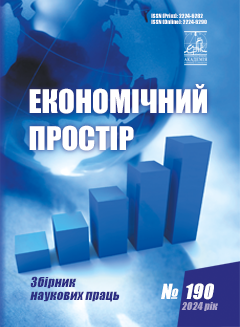УПРАВЛІННЯ РЕЗУЛЬТАТИВНІСТЮ ДІЯЛЬНОСТІ ПІДПРИЄМСТВА
Анотація
У статті визначено сутність, походження, відмінність та взаємозв’язок між поняттями «результат» та «ефект», «результативність» та «ефективність». Акцентовано увагу на цільовій спрямованості категорії «результативності діяльності» та доцільності її розгляду як агрегуючого показника позитивних ефектів, отриманих внаслідок функціонування підприємства. Обґрунтовано необхідність управління результативністю діяльності, окреслено чинники впливу на неї. На основі узагальнення виокремлено традиційний та сучасні підходи до управління результативністю через використання логічно-дедуктивних та емпірично-дедуктивних груп систем показників оцінки, визначено переваги та недоліки їх застосування. Аргументовано доцільність використання системи управління результативністю BPM для вітчизняних підприємств, які функціонують в умовах невизначеності середовища, зумовленого воєнним станом в країні.
Посилання
Базілінська О.Я Фінансовий аналіз: теорія та практика : навчальний посібник. Київ : ЦУЛ, 2009. 328 с.
Дарміць Р.З., Вацик Н.О. Взаємозв’язок результативності та економічної ефективності в системі менеджменту підприємства. НЛТУ України. 2010. Вип. 20.12. С. 153–160.
Ковтуненко В.М. Ідентифікація сутності понять «результативність» і «ефективність» діяльності підприємства та методологія їх оцінки. Інвестиції: практика та досвід. 2014. № 10. С. 93–96.
Кокінз Г. Керування результативністю: Як подолати розрив між оголошеною стратегією і реальними процесами. пер. з англ. Київ : Альвасар. 2021. 318 с.
Кравченко О.А., Ільницький В.В., Ульяновська О.І. Забезпечення результативності і ефективності виробничої діяльності підприємства. Економіка: реалії часу. 2013. № 3(8). С. 29–35.
Кулинич М., Ляшко Л. Методичний інструментарій в аналітичній оцінці результативності. Економічний часопис Східноєвропейського національного університету імені Лесі Українки. 2017. № 4. С. 122−130.
Олексюк О.І. Результативність діяльності підприємств як основа формування їх інвестиційної привабливості. Інвестиції: практика та досвід. 2009. № 3. С. 21–26.
Олексюк О.І. Технологія оцінки результативності діяльності підприємства. Збірник наукових праць ЧДТУ. Серія Економічні науки. 2009. Випуск 22. С. 169–173.
Терещенко О.О., Бабяк Н.Д. Фінансовий контролінг : навчальний посібник. Київ : КНЕУ, 2013. 407 c.
Янголь Г.В. Методичні підходи до вимірювання результативності діяльності підприємства. Стратегія економічного розвитку України. 2013. № 32. С. 225–231.
Cokins G. Performance management: finding the missing pieces (to close the intelligence gap). New Jersey: John Wiley & Sons, Inc., 2004. 305 p.
Weske, M. Business Process Management: Concepts, Languages, Architectures. Springer. 2019. 426 p. DOI: https://doi.org/10.1007/978-3-662-59432-2 (дата звернення 02.03.2024).
Bazilinska O. Ya. (2009) Finansovyi analiz: teoriia ta praktyka [Financial analysis: theory and practice] : navchalnyi posibnyk. Kyiv: TsUL (in Ukrainian)
Darmits R. Z., Vatsyk N. O. (2010) Vzaiemozv’iazok rezultatyvnosti ta ekonomichnoi efektyvnosti v systemi menedzhmentu pidpryiemstva [Interrelation of efficiency and economic effectiveness in the enterprise management system]. NLTU Ukrainy, vol. 20.12, pp. 153–160.
Kovtunenko V. M. (2014) Identyfikatsiia sutnosti poniat «rezultatyvnist» i «efektyvnist» diialnosti pidpryiemstva ta metodolohiia yikh otsinky [Identification of the essence of the concepts of «efficiency» and «effectiveness» of the enterprise and the methodology for their assessment]. Investytsii: praktyka ta dosvid, no 10, pp. 93–96.
Kokinz H. (2021) Keruvannia rezultatyvnistiu: Yak podolaty rozryv mizh oholoshenoiu stratehiieiu i realnymy protsesamy [Performance Management: How to bridge the gap between stated strategy and actual processes]. translation from English. Kyiv: Alvasar. (in Ukrainian)
Kravchenko O. A., Ilnytskyi V. V., Ulianovska O. I. (2013) Zabezpechennia rezultatyvnosti i efektyvnosti vyrobnychoi diialnosti pidpryiemstva [Ensuring the efficiency and effectiveness of the company's production activities]. Ekonomika: realii chasu, no 3(8), pp. 29–35.
Kulynych M., Liashko L. (2017) Metodychnyi instrumentarii v analitychnii otsintsi rezultatyvnosti [Methodological tools for analytical performance evaluation]. Ekonomichnyi chasopys Skhidnoievropeiskoho natsionalnoho universytetu imeni Lesi Ukrainky, no 4, pp. 122–130.
Oleksiuk O. I. (2009) Rezultatyvnist diialnosti pidpryiemstv yak osnova formuvannia yikh investytsiinoi pryvablyvosti [Performance of enterprises as a basis for shaping their investment attractiveness]. Investytsii: praktyka ta dosvid, no 3. pp. 21–26.
Oleksiuk O. I. (2009) Tekhnolohiia otsinky rezultatyvnosti diialnosti pidpryiemstva [Technology for assessing the performance of an enterprise]. Zbirnyk naukovykh prats ChDTU. Seriia Ekonomichni nauky, vol. 22, pp. 169–173.
Tereshchenko O. O., Babiak N. D. (2013) Finansovyi kontrolinh [Financial controlling]: navchalnyi posibnyk. Kyiv: KNEU. (in Ukrainian)
Yanhol H. V. (2013) Metodychni pidkhody do vymiriuvannia rezultatyvnosti diialnosti pidpryiemstva [Methodological approaches to measuring enterprise performance]. Stratehiia ekonomichnoho rozvytku Ukrainy, no 32, pp. 225–231.
Cokins G. (2004) Performance management: finding the missing pieces (to close the intelligence gap). New Jersey: John Wiley & Sons, Inc.
Weske M. (2019) Business Process Management: Concepts, Languages, Architectures. Springer. DOI: https://doi.org/10.1007/978-3-662-59432-2 (accessed March 2, 2024).



